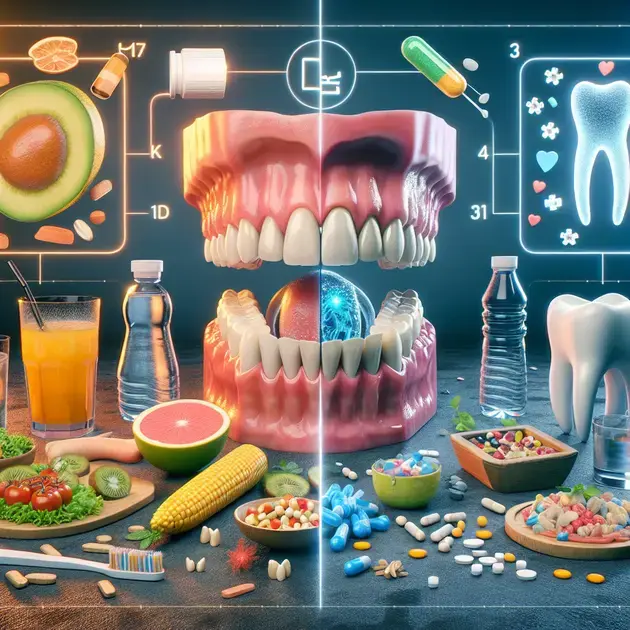Periodontitis medication is a crucial aspect of managing this inflammatory gum disease. As research continues to advance, new treatments and medications are constantly being developed to improve patient outcomes and reduce the impact of this condition on oral health.
Understanding the different types of periodontitis medication available, along with their potential side effects and benefits, is essential for both patients and healthcare providers. In this article, we will explore everything you need to know about periodontitis medication and how it can play a key role in addressing this common dental issue.

Understanding Periodontitis Medication Options
When it comes to understanding periodontitis medication options, it’s important to be aware of the various types of medications available for managing this condition. One common medication is antibiotics, which can help to reduce the bacteria in the mouth that cause periodontitis. These antibiotics can be prescribed by a dentist or periodontist, and it’s crucial to follow the prescribed dosage and duration to effectively combat the infection.
Another medication option for periodontitis is antimicrobial mouth rinses. These rinses can help to reduce plaque and prevent the growth of bacteria in the mouth. Examples of popular antimicrobial mouth rinses include Listerine and Colgate Total. Using these rinses as part of your daily oral hygiene routine can complement professional treatments for periodontitis.
One more medication option to consider is enzyme suppressants. These medications work by blocking specific enzymes that contribute to the inflammation associated with periodontitis. By inhibiting these enzymes, the progression of the disease can be slowed down. Discussing the use of enzyme suppressants with your dental care provider can help determine if this option is suitable for your treatment plan.
It’s important to remember that medication should not be the sole treatment for periodontitis. Proper oral hygiene practices, regular dental cleanings, and lifestyle changes are essential components of managing this condition. By incorporating medication into a comprehensive treatment approach, individuals with periodontitis can improve their oral health and prevent further complications.
The Role of Medication in Managing Periodontitis
Medication plays a crucial role in managing periodontitis by targeting the underlying causes of the disease and helping to control its progression. Antibiotics are often prescribed to combat the bacterial infection that leads to periodontitis. These antibiotics can be taken orally or applied directly to the affected areas, depending on the severity of the condition.
In addition to antibiotics, anti-inflammatory medications may also be recommended to reduce swelling and discomfort associated with periodontitis. These medications can help to alleviate symptoms and improve the overall healing process. Non-steroidal anti-inflammatory drugs (NSAIDs) such as ibuprofen are commonly used for this purpose.
Another important aspect of medication in managing periodontitis is promoting gum health. Medications that promote gum healing and regeneration can help to restore the damaged tissues caused by periodontitis. Topical gels containing growth factors or tissue-stimulating proteins are examples of medications that can aid in this process.
It’s essential for individuals undergoing medication treatment for periodontitis to adhere to the prescribed regimen and follow-up appointments with their dental provider. Monitoring the effectiveness of the medication and making any necessary adjustments is key to successful management of the condition. By working closely with healthcare professionals, patients can optimize the benefits of medication in controlling periodontitis.
Key Considerations for Periodontitis Medication
When considering medication options for periodontitis, there are several key factors to keep in mind to ensure the most effective treatment outcomes. Firstly, it’s important to consult with a qualified dental professional to determine the most suitable medication for your specific condition. The type and severity of periodontitis can influence the choice of medication prescribed.
Another crucial consideration is the potential side effects of the medication. Some medications used to treat periodontitis may have side effects such as gastrointestinal discomfort or allergic reactions. It’s essential to inform your healthcare provider of any existing medical conditions or allergies before starting a new medication regimen.
Cost and accessibility are also significant factors to consider when evaluating periodontitis medication options. Certain medications may be more expensive or require special authorization, depending on your insurance coverage. Discussing these aspects with your healthcare provider can help find a medication that is both effective and affordable for your individual situation.
Furthermore, adherence to the prescribed medication regimen is vital for successful treatment of periodontitis. Skipping doses or discontinuing medication prematurely can hinder the healing process and allow the condition to worsen. Following the instructions provided by your dental provider and scheduling regular follow-up visits are essential for monitoring progress and adjusting the treatment plan as needed.
Overall, choosing the right medication for managing periodontitis involves careful consideration of various factors, including efficacy, side effects, cost, and adherence. By working collaboratively with your dental care team and staying informed about your treatment options, you can effectively utilize medication as part of a comprehensive approach to controlling periodontitis.

**Understanding the Impact of Nutrition on Periodontitis Treatment**
Nutrition and Periodontal Health
Proper nutrition plays a crucial role in maintaining overall health, including oral health. When it comes to periodontitis treatment, a balanced diet can have a significant impact on the healing process. Foods rich in essential nutrients like vitamin C, vitamin D, and calcium can help support gum health and boost the immune system, aiding in the fight against periodontal disease.
Furthermore, incorporating foods with anti-inflammatory properties, such as fatty fish and leafy greens, can help reduce inflammation in the gums and speed up the healing process. On the other hand, a diet high in sugar and processed foods can contribute to the progression of periodontitis by fueling the growth of harmful bacteria in the mouth.
It is important for individuals undergoing periodontitis treatment to work closely with their healthcare provider or a nutritionist to develop a customized meal plan that supports their oral health goals. By making the right food choices, patients can enhance the effectiveness of their treatment and improve their overall well-being.
Hydration and Gum Health
In addition to a balanced diet, adequate hydration is essential for maintaining healthy gums during periodontitis treatment. Water helps wash away food particles and bacteria from the mouth, preventing plaque buildup and reducing the risk of gum disease progression.
Dehydration can lead to dry mouth, which creates an ideal environment for bacteria to thrive and cause further damage to the gums. Therefore, staying properly hydrated throughout the day is crucial for supporting the healing process and promoting optimal oral health.
Patients undergoing periodontitis treatment should aim to drink plenty of water and limit their intake of sugary and acidic beverages, which can contribute to tooth decay and exacerbate gum inflammation. By prioritizing hydration, individuals can complement their nutrition plan and improve the outcomes of their periodontitis treatment.
Supplements and Oral Health
In some cases, healthcare providers may recommend supplements to support periodontitis treatment and enhance gum health. Vitamin supplements, such as vitamin C and coenzyme Q10, have been shown to have beneficial effects on the healing of gum tissues and the reduction of inflammation.
However, it is important for patients to consult with their healthcare provider before starting any supplement regimen, as excessive intake of certain vitamins and minerals can have negative consequences on oral health. By incorporating supplements as part of a comprehensive treatment plan, individuals can address nutritional deficiencies and improve the outcomes of their periodontitis treatment.
Overall, the impact of nutrition on periodontitis treatment should not be underestimated. By prioritizing a healthy diet, staying hydrated, and considering the use of supplements under professional guidance, patients can play an active role in supporting their oral health and enhancing the effectiveness of their treatment.
**
Conclusion
**
Understanding the crucial link between nutrition and periodontitis treatment is essential for individuals seeking to improve their oral health. A balanced diet rich in vital nutrients like vitamin C, vitamin D, and calcium can significantly impact the healing process, supporting gum health and boosting the immune system to combat periodontal disease effectively.
Moreover, the incorporation of foods with anti-inflammatory properties, such as fatty fish and leafy greens, can aid in reducing gum inflammation and expediting the healing journey. Conversely, a diet high in sugar and processed foods may exacerbate periodontitis by fostering the growth of harmful bacteria in the oral cavity, highlighting the importance of mindful food choices during treatment.
In addition to nutrition, adequate hydration plays a key role in maintaining healthy gums while undergoing periodontitis treatment. Water acts as a natural cleanser, washing away food particles and bacteria to prevent plaque buildup and curb the progression of gum disease. Dehydration can lead to a dry mouth, creating an ideal environment for bacterial growth and further gum damage, underscoring the significance of staying properly hydrated throughout the day.
Furthermore, healthcare providers may suggest supplements such as vitamin C and coenzyme Q10 to enhance gum health and aid in the healing process. However, it is crucial for patients to consult professionals before starting any supplement regimen to avoid adverse effects on oral health. By integrating supplements into a comprehensive treatment plan, individuals can address nutritional deficiencies and enhance the outcomes of their periodontitis treatment effectively.
In conclusion, the impact of nutrition, hydration, and supplements on periodontitis treatment should not be underestimated. By prioritizing a healthy diet, maintaining proper hydration, and seeking guidance on supplement usage, patients can actively contribute to their oral health and improve the effectiveness of their treatment, ultimately leading to better overall well-being.



